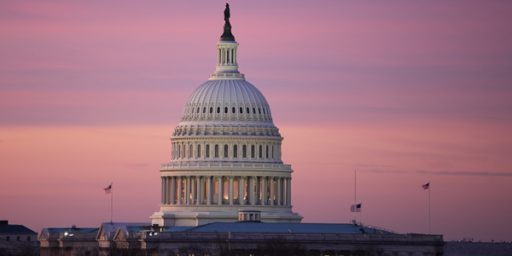Obama Spending Freeze
 My colleagues Alex Knapp and (in the comments) Dave Schuler have already outlined the most obvious centrist qualms about President Obama’s discretionary spending freeze proposal: That, by omitting Defense, DHS, and Veterans Affairs, it leaves most of the money on the table and that it does nothing to solve the problem of spending growth from rising health care costs (something, incidentally, it has in common with the ailing healthcare plan).
My colleagues Alex Knapp and (in the comments) Dave Schuler have already outlined the most obvious centrist qualms about President Obama’s discretionary spending freeze proposal: That, by omitting Defense, DHS, and Veterans Affairs, it leaves most of the money on the table and that it does nothing to solve the problem of spending growth from rising health care costs (something, incidentally, it has in common with the ailing healthcare plan).
As one would expect, Republican-leaning bloggers are having a field day, pointing to this as an example of Obama’s amateurism, inconsistency, cluelessness, and fecklessness.
More interestingly, many prominent Democrat-leaning bloggers are piling on, too.
Economist Brad DeLong excoriates “Barack Herbert Hoover Obama,” albeit softening that somewhat with an update noting, “An administration source says that he believes that discretionary non-security is not frozen at 2010 ex-stimulus levels for 2011, but is instead bumped up from 2010 to 2011–that the freeze part applies to fiscal 2012, 2013, and 2014.”
There are two ways to look at this. The first is that this is simply another game of Dingbat Kabuki. Non-security discretionary spending is some $500 billion a year. It ought to be growing at 5% per year in nominal terms (more because we are in a deep recession and should be pulling discretionary spending forward from the future as fast as we can)–that’s only $25 billion a year in a $3 trillion budget and a $15 trillion economy.
But in a country as big as this one even this is large stakes. What we are talking about is $25 billion of fiscal drag in 2011, $50 billion in 2012, and $75 billion in 2013. By 2013 things will hopefully be better enough that the Federal Reserve will be raising interest rates and will be able to offset the damage to employment and output. But in 2011 GDP will be lower by $35 billion–employment lower by 350,000 or so–and in 2012 GDP will be lower by $70 billion–employment lower by 700,000 or so–than it would have been had non-defense discretionary grown at its normal rate. (And if you think, as I do, that the federal government really ought to be filling state budget deficit gaps over the next two years to the tune of $200 billion per year…)
And what do we get for these larger output gaps and higher unemployment rates in 2011 and 2012? Obama “signal[s] his seriousness about cutting the budget deficit,” Jackie Calmes reports.
As one deficit-hawk journalist of my acquaintance says this evening, this is a perfect example of fundamental unseriousness: rather than make proposals that will actually tackle the long-term deficit–either through future tax increases triggered by excessive deficits or through future entitlement spending caps triggered by excessive deficits–come up with a proposal that does short-term harm to the economy without tackling the deficit in any serious and significant way.
Statistician Nate Silver piles on, dubbing the plan “The White House’s Brain Freeze.”
I’ll let the economists talk about the wisdom of curtailing government spending in the middle of a massive consumption deficit, but what concerns me more is the politics. Specifically, the sort of cognitive dissonance that is going to be created in the mind of the average voter when the White House is promising to freeze spending on the one hand (or, more accurately, this will be the media caricature of their gambit), and on the other, trying to defend its stimulus and its health care reform package, trying to excuse the bailout package as a necessary evil, and perhaps trying to champion new programs. Sure, the story is probably being somewhat overreported, and the spending “freeze” will only apply to certain types of spending. And it’s applied relative to the already-elevated levels of spending from the FY2010 budget, and not some earlier baseline. There’s more bark here than bite, in other words: “freeze on discretionary spending” means something different on K Street than it does on Main Street. But that’s precisely what will make the White House (or at least the Democrats collectively) look flip-floppy. Every time the Democrats propose a jobs bill, or a big investment in alternative energy, you’re going to have Krauthammer and Kristol chomping at the bit to go on Fox News and proclaim Obama to be a hypocrite. Pity Robert Gibbs trying to parse his way out of that. This is not how one wins news cycles — or elections.
Marc Ambinder joins in with, “Obama’s 3 Year Freeze; Democrats Brain Freeze.”
This amounts to about a sixth of the entire budget. Liberals fear that discretionary spending cuts are like fig leaves with sharp edges. They’re designed to cover something ugly and yet they hurt — they hurt those who most rely on government services, who tend to poor and non-white. The administration insist that important programs will be kept alive and functioning, and that funding for, say, education initiatives will rise, while funding for other programs will decline — and that the president’s priorities will be well-funded. The freeze is irrelevant to health care because Medicare, Medicaid and taxes are all mandatory. So too are many of the programs for the neediest, such as unemployment insurance and Pell Grants. And many of the other programs were plussed up recently so the White House is freezing them at a very high level. A second stimulus package wouldn’t be included either.
He offers a longish analysis of the potential political fallout, concluding, “The big if — IF the president really fights for this…fights against his own party, and does so with conviction — if Democrats decide to embrace this (which is doubtful), then it could help both his party and himself.”
A big If, indeed.
My standard position on these things is that they’re political cowardice aimed at creating the false illusion of political courage. That was true of Gramm-Rudman and all of the freeze this, across-the-board that proposals that have come along since. Sure, they force cuts, which I generally favor. But they do so willy-nilly, without any analysis of costs and benefits. Much better, in my view, is to cut bad programs (various corporate subsidies, including farm subsidies, for example) and keep the good ones.
Granted, in the current polarized environment, it’s virtually impossible to do anything even remotely courageous and rational. But presidents can make their case to the public — Obama has a State of the Union address tonight, I seem to have heard somewhere — and then lead.





I think if we take this at face value it is the first move in the roll off stimulus and the beginning of an exit plan.
Kinda funny how political commentators of all stripes seem to take this as a policy plan in isolation.
It has essentially no meaning by itself … but that is perhaps why some look at it that way.
(Or perhaps looking at it as the start of an exit is a political no-man’s land. Republicans are so sore about stimulus that they don’t want to support an exit. Harder core Democrats, like DeLong want them some more stimulus.)
Didn’t Alex’s post say exactly this: that it was meant as a sort of redistribution of spending on the discretionary items, not literally freezing every single item?
From Alex’s post (or rather, from the quoted part of Yglesias’s report):
How about we stop shitting away hundreds of billions of dollars in Iraq and Afghanistan?
Anyone who believes that the actual result of this “some go up some go down” ploy will be a net spending freeze is an absolute fool.
Another knee-jerk reaction, I’m afraid, James.
According to what I’ve read, that’s not true at all.
No one has said every budget is frozen, or even every cabinet-level department budget is frozen. Just that total, non-defense discretionary spending is going to be frozen. That leaves tons of room for cutting bad programs and boosting good ones.
That, by omitting Defense, DHS, and Veterans Affairs, it leaves most of the money on the table and that it does nothing to solve the problem of spending growth from rising health care costs.
This is an astute observation, but I don’t see how capping discretionary spending at $447 billion a year should be disturbing. Seems like common sense.
You pay for the important stuff, put the less important stuff on a budget, and move forth. It’s not a cure for cancer, but it’s not huffing asbestos either.
Political concerns are just that…political concerns. The most important question to ask is not “How is this going to hurt or help my/his/her election prospects?” but “How is this going to hurt or help the fiscal health of the country?”
Not gonna happen. You can’t do that kind of work from the top down. The bureaucracy is ready and able to defeat such measures. Clinton/Gore tried it. Gingrich and the Republicans tried it, That is why it is amateur hour. Especially since this administration doesn’t even have the top tier fully appointed yet.
The Bush administration had some unsung success in cleaning up the bureaucracy. They did it by quickly appointing experienced administrators deep into the heart of the beast. People knowledgeable and experienced enough to cut through the resistance. Where I worked they appointed a retired flag officer to a post formerly given to academics with no management skills. That move struck fear in the heart of the program managers. That and the painful lesson that at budget time, they not only had to argue for the increase they wanted but could find themselves having to explain what they spent their current budget on. Not surprisingly the first few times, the old timers where caught flatfooted when asked explain what they were doing and why it was important. Quite a few bad or superseded programs were ended. Quietly, without challenging the defenders directly. Just fade them away slowly till they aren’t noticed.
In the end though, outside of defense, most of the money is either grants to powerful constituencies or labor costs. So this plan either buck K street, which we’ve seen to evidence of, or RIFs employees, which won’t make the unions happy. It doesn’t matter that the level will be higher. In government, you are only succeeding if you have more than last year otherwise, it is a catastrophe.
JKB, I wasn’t implying that it was easy, or that it would happen, only that what was being proposed was not what James described.
Also, your lauding of the Bush administration’s budget practices is rich.
According to the history books, they mostly succeeded.
Oh, and it helped that they had a Republican congress to help them out.
Good idea, we can bring home the troops so they can fight the TEA party members, and then we give the money
we save to the union bosses for creating more red um um um I meant green jobs….. your brilliant!!!
“Barack Herbert Hoover Obama,â€
Herbert Hoover has suffered from feckless pseudo-punditry since he was replaced by gross incompetence in ’33, but he has never been so profoundly slandered!
Perhaps the moniker claimed by the big zer”O” himself would be more appropriate…
“Barack FDR Obama”